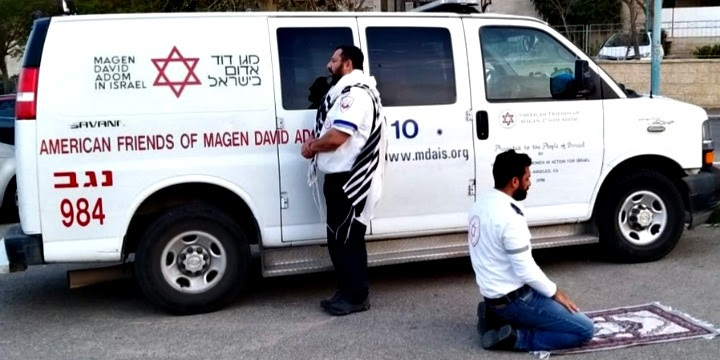Melanie Phillips: Israel still suffers virus of hate even as it saves Arab lives
While countries around the world struggle to get on top of the Covid-19 crisis, Israel’s achievement so far has been remarkable.
Its mortality rate from the virus has been vastly smaller, in proportion to its population, than the rate in countries such as Britain, Sweden or the United States. That’s largely because it tackled the virus with the kind of bold, strategic approach with which it defends itself against its physical foes.
This week, with new cases reduced to a few dozen, it started to lift a wide range of restrictions on public activity. Many are fearful, however, that the country’s exit from lockdown is too fast and incoherent, and may send the infection rate soaring again out of control.
That said, Israel’s defense against this invisible enemy has also highlighted something positive that previously wasn’t fully appreciated.
Thousands of Israeli Arab health-care professionals have been putting their own lives on the line by treating virus patients alongside their Jewish colleagues.
There could scarcely have been a more graphic demonstration of equality and indispensability, and it will have been noticed by Israel’s Jews and Arabs alike. It vividly illustrated the prominence of Israeli Arabs in the country’s health system, in which they make up 17 percent of its doctors, 24 percent of its nurses and 48 percent of its pharmacists.
This may have profound political consequences in a society where the status of Israeli Arabs, who form some 20 percent of the population, is a sensitive source of mutual suspicion, exaggeration and denial.
Sharren Haskel MK: Sir Mick simply hasn’t been paying attention
I welcomed Mick Davis’s article in Jewish News last week as an important voice on Israel-Diaspora relations. However, to my great sadness, I strongly contest his grossly inaccurate assertions. Of course, he is welcome to his opinion. If he were an Israeli citizen he would be welcome to vote accordingly. I’m saddened that someone who has held such high office in an important Diaspora community feels it appropriate to publish such distortions.World Needs New Perspective on Israel
As a current MK, allow me to answer his accusations. Sir Mick claims Israel needs “a vision for its future with the Palestinians”. He will be pleased to know we have one.
While the vision of the Clinton Initiative has failed time after time for the past 30 years, we continue to stand firm in the face of the ongoing terrorism against the people of Israel. Hours before Sir Mick published his piece, a Palestinian terrorist stabbed a 62-year-old woman as she was shopping in my home town, Kfar Saba. The day before, another Palestinian terrorist deliberately ran over a policeman at a junction in Judea and Samaria. These are not isolated incidents or caused by Israeli policies.
They are born of the same hatred that led to the massacre of Jews in Hebron in 1929 – even before the state’s founding.
They are part of an ongoing trend of hatred and violence supported by the Palestinian Authority which continues joyfully to promote anti-Jewish vitriol in their schools, media, and mosques, and proudly pay murderers for the Jewish blood they spill.
Yet, at the same time, we do continue to pursue a peaceful end to the conflict. Without a partner for peace, the current plan led by President Trump offers the Palestinians levels of autonomy, economic development and a higher standard of living than enjoyed by most peoples in the region.
And yes – it offers Israel the chance to establish sovereignty over core areas of Israel.
Sir Mick suggests that Israel’s political echelons have decided that the relationship with the Palestinians can be ignored. Let’s be clear. When we send our children to school, they have an armed guard at the gate. Our shopping malls have metal detectors.
When we send our children to the army, we do so knowing they may well see battle.
Israel is not ignoring the relationship with the Palestinians, we are palpably aware of the situation. But Israel has long made the decision – as have many of our neighbours – that there can be progress on a range of issues, including regional affairs, even in the absence of a resolution to the conflict with the Palestinians.
On a recent Zoom call with Jewish National Fund-USA (JNF-USA) in Chicago, The New York Times contributor, Matti Friedman, lamented the immense gap in perceptions between how the world and Israelis see Israel.Latma 2020, Episode 5
"The uninformed perceive Israel as a conflict zone or a place that's unsafe to visit," said Friedman. "This is because whenever there's any instance of violence, it automatically receives saturated press coverage. When I was a correspondent for AP, the size of the bureau covering Israel was 40 people. This was significantly more than their office in China at the time."
Friedman highlighted the media's disproportionate focus on Israel and noting that according to his calculations, seven people in Jerusalem died in violent circumstances in 2019, while in cities of similar size such as Indianapolis, 179 homicides took place garnering little coverage.
"Looking at fatalities is a crass way of doing things," admitted Friedman, "however, it's telling. We can sometimes forget that Israel's conflict is small in terms of global conflict."
Friedman also discussed the often-overlooked differences between the left- and right-wing movements of the U.S. and Israel. "Political terminology in the US is different," said Friedman. "Being on the 'left' in Israel is different from being on the 'left' in the U.S. – and the same is true for the 'right'. Israel's 'left' and 'right' are defined by their respective stances and approaches to dealing with the conflict. The majority of Israelis, throughout the left and right, are in favor of gun control, abortion, public healthcare, and government education. On all these issues, Netanyahu would be considered a Democrat."
Ultimately, Friedman believes the way to bridge the perception gap cannot be done through arguing about press coverage. "We shouldn't get upset. Rather, we need to establish a real connection with the actual country [Israel]. It means getting involved with Jewish National Fund-USA – an organization that is perhaps more involved in the everyday life of Israel than most. The other way to get around it is to get on a plane and spend time here in Israel (when international travel resumes). What's accurate and inaccurate will be resolved by visiting here."
this time expanded to 15 minutes. The unhinged parents’ Zoom song, meeting of Hendel and Hauser’s immense Derech Eretz faction, Story Time and EU representative Johann Phlegmat’s first guest appearance on the new Latma. Enjoy! (h/t Yerushalimey)
Latma 2020, Episode 6
Latma 2020, Episode 6 with the Judgefather as chief arbitrator, attempts to see the money promised by the Treasury to the self-employed, and the organizer of the Alternative Memorial Day talks about her plans for the future (h/t Yerushalimey)










































